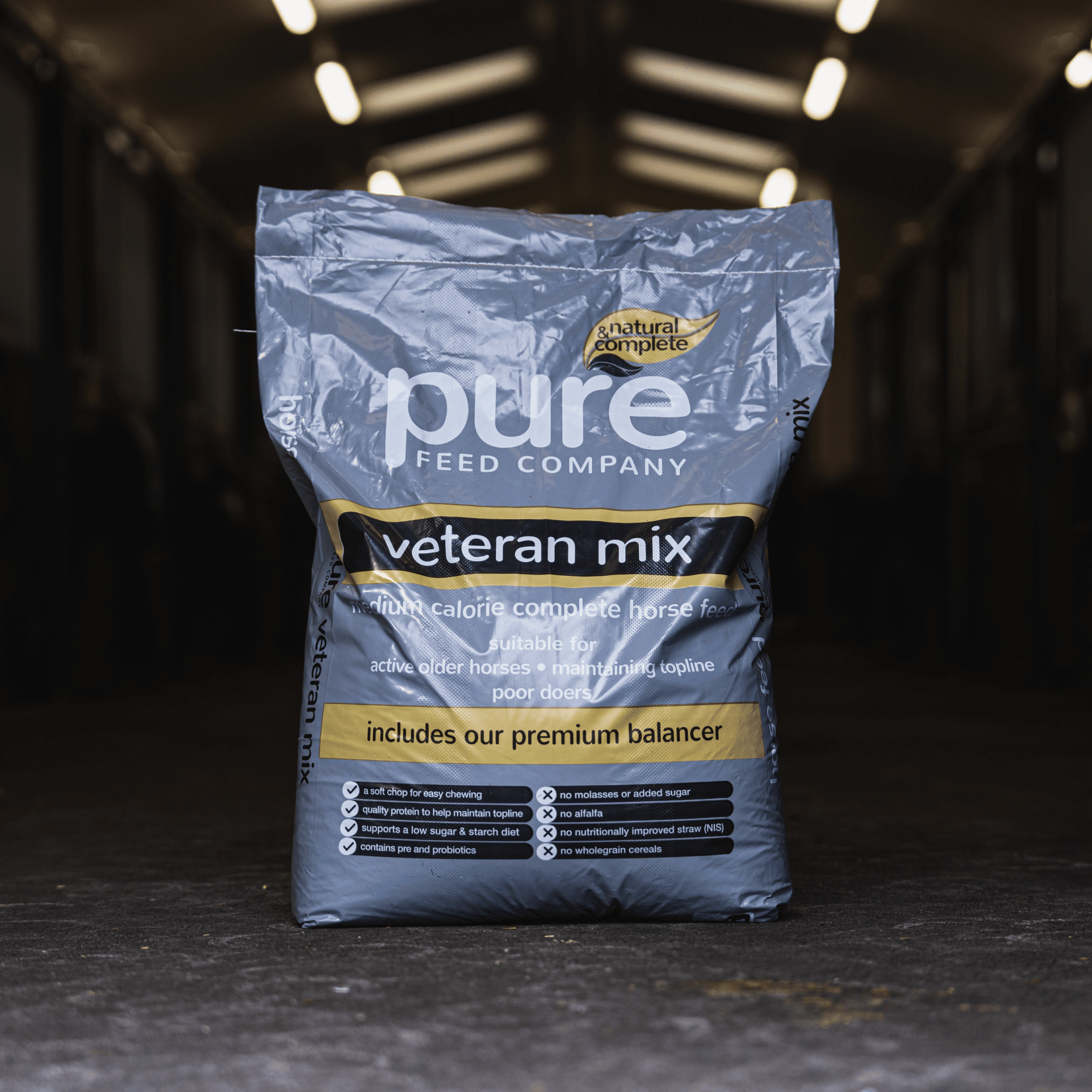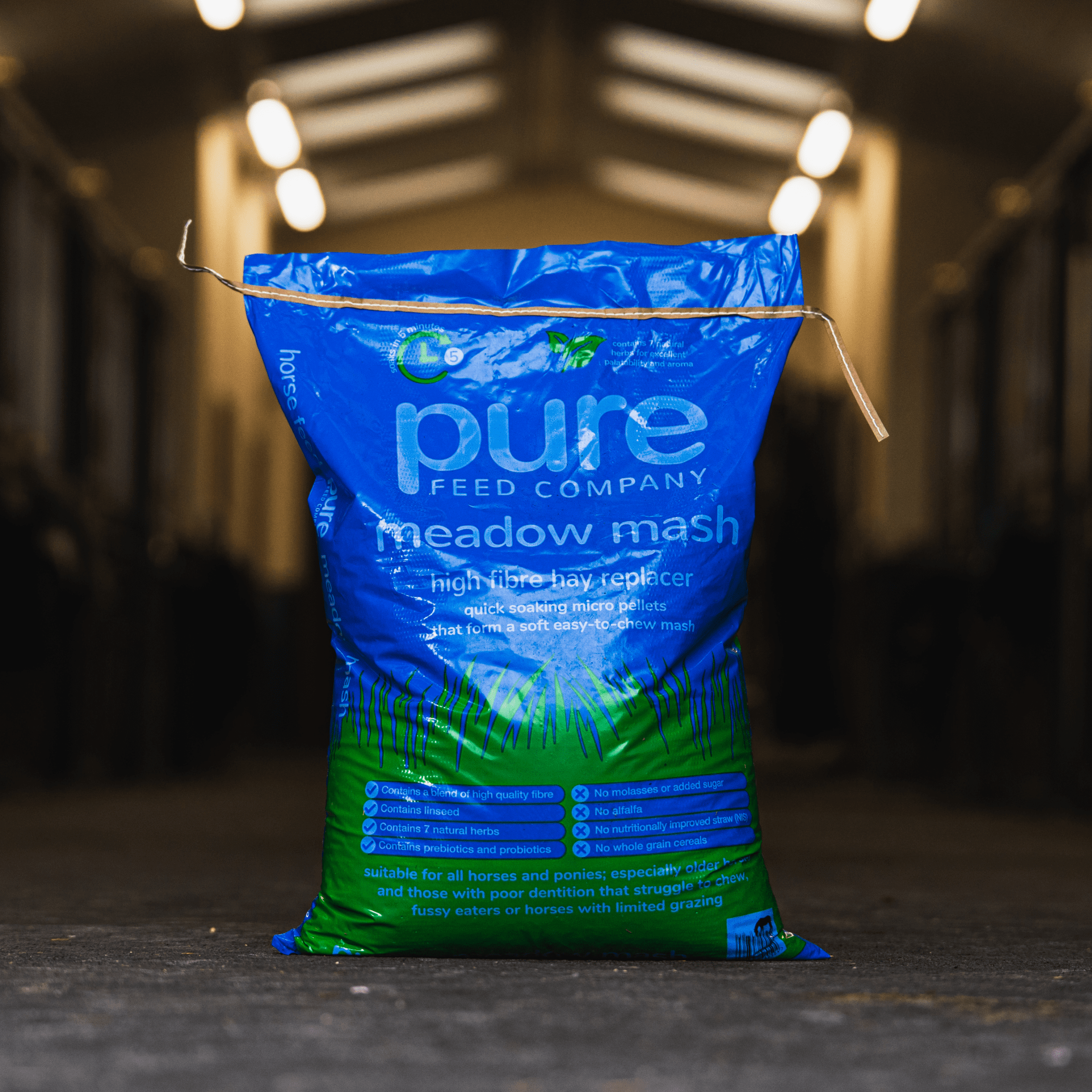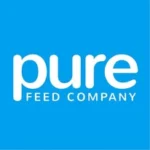FEED ADVICE – HEALTH
Essential Guide to Laminitis in Horses
Contrary to popular belief, laminitis can occur all year-round, not just in the spring. Laminitis is an emergency condition that requires prompt action whenever it is suspected. It is an inflammatory condition of the laminae within the horse’s feet. The laminae are the tissues that attach the pedal bone to the hoof wall inside the hoof capsule. Many people mistakenly believe that laminitis only affects overweight ponies, but horses of all types, ages, and sizes can develop laminitis for various reasons.
Key Highlights

Laminitis is a serious and often painful condition caused by inflammation and damage to the sensitive laminae in the hoof.

It can affect any horse, not just overweight ponies, with early signs including short strides, reluctance to walk on hard ground, and shifting weight.

Common causes include metabolic issues, endotoxemia, and excessive intake of rich grass.

Diagnosis and treatment involve veterinary assessment, possible x-rays, immediate symptom relief, and long-term management through diet and hoof care.
Understanding Laminitis
The horse’s hoof is a complex and highly specialized structure that plays a vital role in the horse’s overall health and performance. It is made up of several components, including the hoof wall, the sole of the hoof, and the coffin bone.
The hoof wall is the hard outer covering of the hoof that provides protection and support. It is made of keratinized cells and forms a protective barrier against external forces and infections. The hoof wall grows continuously from the coronet band at the top of the hoof downward.
The sole of the hoof is the concave area between the hoof wall and the frog. It acts as a shock absorber during locomotion and helps distribute weight evenly across the foot. The sole is also responsible for protecting the sensitive structures inside the hoof, including the coffin bone.
The coffin bone, also known as the distal phalanx or pedal bone, is a triangular bone located within the hoof. It is attached to the hoof wall by the laminae and provides support and structure to the foot. The coffin bone is surrounded by soft tissues, including the laminae, which help to suspend and stabilize the bone within the hoof capsule.
The proper functioning and health of the hoof are essential for a horse’s overall soundness and well-being. Any disruption or damage to the structures within the hoof, such as inflammation of the laminae in laminitis, can have severe consequences and lead to pain, lameness, and even permanent damage.
During an active case of laminitis, the inflammation of the laminae disrupts the normal blood flow to the hoof, leading to further damage and deterioration of the structures inside the hoof. This disruption in blood flow can cause the laminae to weaken and separate, resulting in the rotation or sinking of the pedal bone. The separation and displacement of the pedal bone can cause extreme pain and lameness for the horse.
Laminitis can occur in all four feet, but it is most commonly seen in the front feet. The severity of laminitis can range from mild discomfort to severe lameness. In severe cases, the horse may be unable to bear weight on its hooves and may need to lie down to relieve the pain.


Defining Laminitis: Causes and Trigger Factors
Laminitis can be caused by various factors, and understanding these causes is crucial for prevention and management.
It is important to identify and address the underlying causes and trigger factors of laminitis to prevent its occurrence and manage the condition effectively. Proper management strategies, including dietary adjustments, regular exercise, and veterinary care, can help reduce the risk of laminitis in horses.
Some common causes and trigger factors of laminitis include:
Identifying Early Signs of Laminitis in Horses
Early identification of laminitis is crucial for prompt intervention and treatment. The earlier the condition is recognised, the better the chances of a positive outcome for the horse. Some early signs of laminitis to watch out for include:


Laminitis Progession
The Role of the Pedal Bone in Laminitis Progression
The pedal bone, also known as the distal phalanx, plays a central role in the development and progression of laminitis. In severe cases, inflammation of the sensitive laminae can lead to the rotation or sinking of the pedal bone within the hoof capsule.
Under normal conditions, the pedal bone is suspended within the hoof and securely anchored by the laminae — a complex network of interlocking tissues. However, when these structures become weakened or inflamed due to laminitis, they can no longer provide adequate support. This may allow the pedal bone to rotate or shift downwards, and in extreme cases, it can even penetrate the sole of the hoof.
The movement and misalignment of the pedal bone are extremely painful, often resulting in significant lameness and the risk of further complications such as founder. Prompt, effective management is essential to limit damage to the laminae and stabilise the position of the pedal bone, supporting both treatment and recovery.
Progression to Founder
If laminitis advances unchecked, it can lead to a serious and often devastating condition known as founder. Founder refers to the mechanical failure of the hoof’s internal support system, resulting in the displacement and rotation of the pedal bone away from the hoof wall.
In these cases, the pedal bone rotates and sinks within the hoof capsule, causing intense pain, marked lameness, and long-term structural changes to the foot. This misalignment damages the hoof architecture and leads to further deterioration of the laminae.
Affected horses typically show severe, sometimes non-weight-bearing lameness. In advanced cases, the pain and structural damage may be so severe that euthanasia becomes the most humane outcome.
Early recognition and intervention are critical to prevent laminitis from progressing to founder. With timely and appropriate care, it is possible to minimise long-term damage and improve the horse’s prospects for recovery and quality of life.
Diagnostic Approaches for Laminitis
Accurate diagnosis of laminitis is essential for appropriate treatment and management. There are various diagnostic approaches that veterinarians use to evaluate and diagnose laminitis in horses.
These approaches include:
Clinical examination and history taking: The veterinarian will perform a thorough examination of the horse, looking for signs of lameness, changes in behavior, and physical symptoms. They will also gather information about the horse’s medical history, diet, and management.
Imaging techniques: X-rays are commonly used to assess the condition of the hooves, determine the position of the pedal bone, and identify any structural changes or damage. These imaging techniques can provide valuable information for diagnosis and treatment planning.
By utilizing these diagnostic approaches, veterinarians can accurately diagnose laminitis, determine the severity of the condition, and develop an appropriate treatment and management plan for the affected horse.

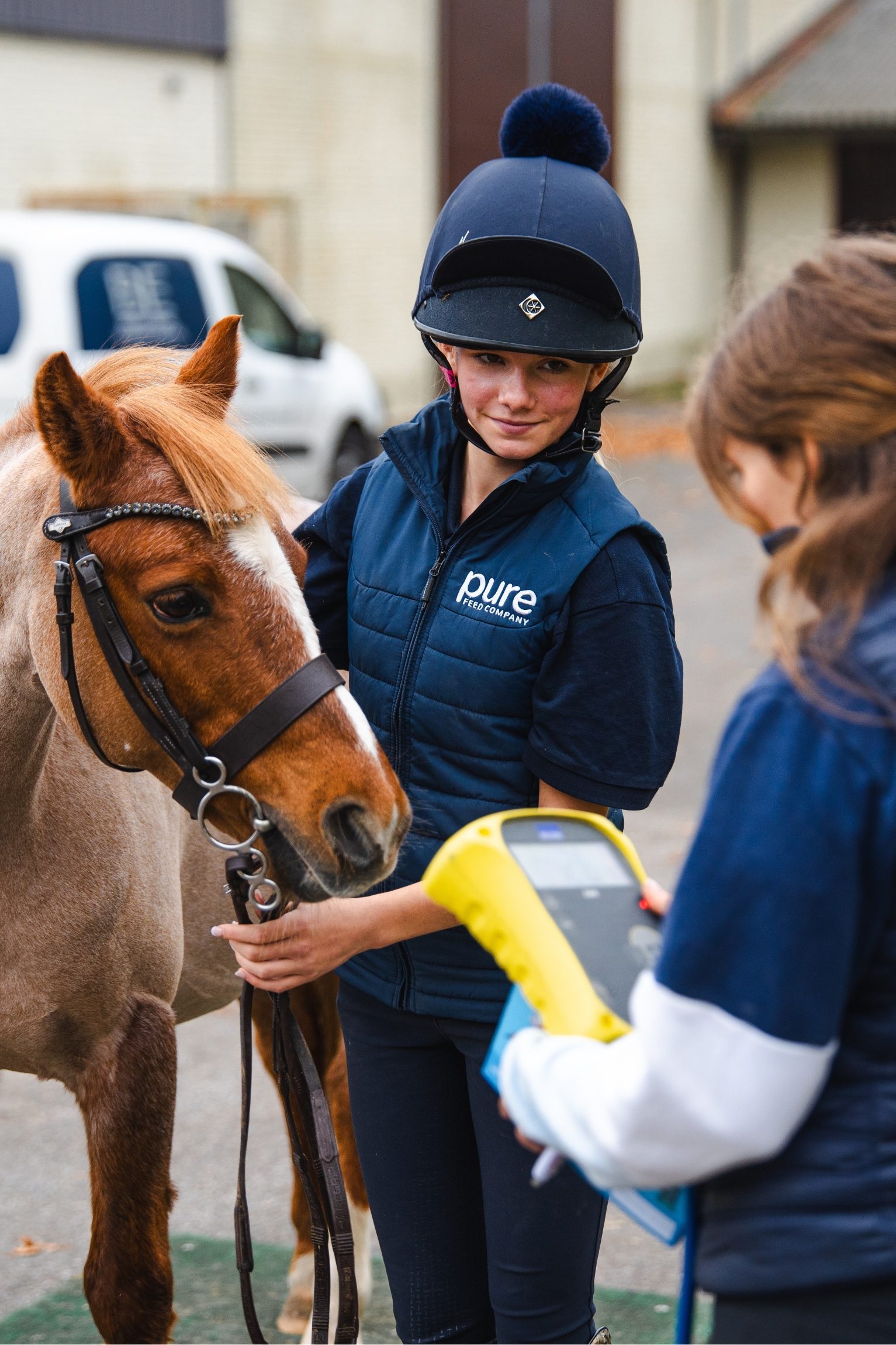
Effective Management and Treatment Strategies
Effective management and treatment strategies are crucial for ensuring the best possible outcome for horses with laminitis. Prompt intervention and ongoing care are essential in minimizing pain, reducing inflammation, and promoting healing and recovery. Some key approaches to managing and treating laminitis include:
Immediate care measures to alleviate symptoms, such as box rest and deep bedding.
Providing pain relief and anti-inflammatory medications as prescribed by a veterinarian.
Regular farrier care, including trimming and shoeing techniques tailored to support the affected hooves.
Long-term management plans to promote recovery and rehabilitation, including weight loss, regular exercise, and appropriate diet adjustments.
By implementing these strategies, horse owners and veterinarians can work together to manage laminitis effectively and improve the horse’s quality of life.
Dietary Management: What to Feed and What to Avoid
Dietary management plays a crucial role in preventing and managing laminitis. Careful attention to the horse’s diet can help reduce the risk of laminitis and support overall health. Some key considerations for dietary management include:
Low sugar and starch diet: Restricting dietary intake of non-structural carbohydrates, including sugars and starches, helps minimize glycaemic fluctuations, mitigating insulin resistance, and reducing the risk of laminitic episodes in susceptible individuals.
Balanced Forage: Providing high-quality forage sources, such as mature grass hay or low-NSC hay alternatives, ensures a consistent source of fibre, essential nutrients, and energy without predisposing horses to metabolic disturbances
Soaking hay: soaking hay nets prior to feeding will help remove the sugar and starch prior to feeding it to the horse. It is recommended to use as much water as possible when soaking hay to maximise the removal of sugar. Hay should be soaked for a minimum of 2 hours prior to feeding
Supplements: supplementation with omega-3 fatty acids, antioxidants, and hoof-supportive nutrients, such as biotin, methionine, and zinc, may promote hoof strength, integrity, and resilience in laminitic horses.
Field Management: Strategic pasture management practices, including rotational grazing, strip grazing, or utilising grazing muzzles, help regulate carbohydrate intake, limit access to lush pasture, and minimise the risk of grass-associated laminitis.
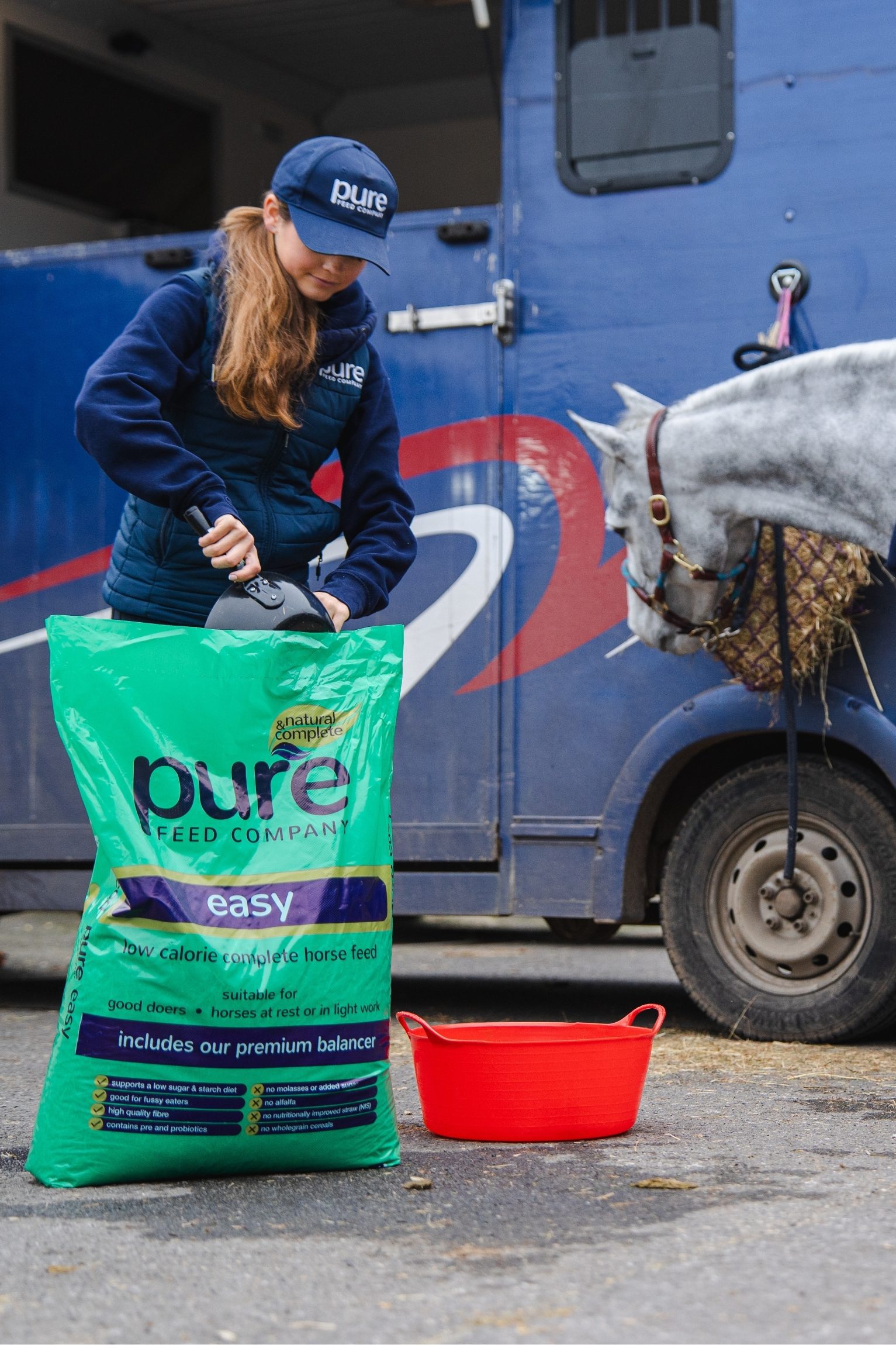
Conclusion
Understanding and addressing laminitis in horses are crucial for their well-being. Early detection, proper management, and preventive measures play key roles in safeguarding horses from this painful condition. By familiarizing yourself with the signs, diagnostic approaches, and effective treatment strategies outlined in this guide, you can effectively care for horses susceptible to laminitis. Regular monitoring, appropriate dietary adjustments, and attentive hoof care are essential components of a comprehensive approach to managing laminitis.
What we recommend for laminitic horses
Made in the UK
We are proud to say that all of our feeds are produced here in the UK
FREE Shipping
We offer FREE SHIPPING for all orders in the UK with 15 bags and over*
Sustainable
We are dedicated to playing our part in making the world more sustainable

100% Natural
We use high-quality ingredients and no unnecessary additives.
Thousands of people love our feeds
We’re increasingly choosing less processed food for ourselves because we understand how additives can impact our digestive system and overall well-being. The same principle applies to our horses.
That’s why Pure Feed is mould inhibitor free.
Instead of relying on chemical preservatives, we prioritise ingredient quality, controlled storage, and specially produced porous bags to maintain freshness and nutritional integrity. This helps support the hindgut environment and avoids unnecessary exposure to additives that can disrupt the delicate balance of the equine microbiome.
👉 Switch to evidence-led feeding; discover the Pure Feed range now

We’re increasingly choosing less processed food for ourselves because we understand how additives can impact our digestive system and overall well-being. The same principle applies to our horses.
That’s why Pure Feed is mould inhibitor free.
Instead of relying on chemical preservatives, we prioritise ingredient quality, controlled storage, and specially produced porous bags to maintain freshness and nutritional integrity. This helps support the hindgut environment and avoids unnecessary exposure to additives that can disrupt the delicate balance of the equine microbiome.
👉 Switch to evidence-led feeding; discover the Pure Feed range now
Feeding your horse doesn’t have to be so confusing💡
A complete feed gives your horse everything they need in one scoop: gut-friendly fibre, energy, protein, vitamins & minerals, without the stress of juggling multiple buckets.
We have a complete feed for every horse:
✔ Good doers
✔ Poor doers
✔ Leisure or competition horses
✔ Sensitive or digestive-prone types
💬 Got a friend who overcomplicates feeding? Tag them!

Feeding your horse doesn’t have to be so confusing💡
A complete feed gives your horse everything they need in one scoop: gut-friendly fibre, energy, protein, vitamins & minerals, without the stress of juggling multiple buckets.
We have a complete feed for every horse:
✔ Good doers
✔ Poor doers
✔ Leisure or competition horses
✔ Sensitive or digestive-prone types
💬 Got a friend who overcomplicates feeding? Tag them!
Did you know that all of our complete feeds contain Vitamin A? 🧬
Essential for your horse’s health, vitamin A supports:
👀 Vision
🛡️ Immune system
✨ Skin, coat & mucous membranes
📈 Growth & reproduction
Even with good forage, intake can vary, our complete feeds provide consistent, bioavailable vitamin A every day.
💬 Questions about vitamins in your feed? Drop them below!

Did you know that all of our complete feeds contain Vitamin A? 🧬
Essential for your horse’s health, vitamin A supports:
👀 Vision
🛡️ Immune system
✨ Skin, coat & mucous membranes
📈 Growth & reproduction
Even with good forage, intake can vary, our complete feeds provide consistent, bioavailable vitamin A every day.
💬 Questions about vitamins in your feed? Drop them below!
Forget juggling powders, syrups, and electrolytes after every ride; Refuel makes recovery simple and effective in one complete feed.
Here’s what it does:
🔹 Replenishes electrolytes lost in sweat to support hydration and muscle function
🔹 Supports muscle repair with high-quality, digestible protein
🔹 Packed with antioxidants to reduce oxidative stress and speed recovery
Tap the link in bio to learn more about Refuel today!

Forget juggling powders, syrups, and electrolytes after every ride; Refuel makes recovery simple and effective in one complete feed.
Here’s what it does:
🔹 Replenishes electrolytes lost in sweat to support hydration and muscle function
🔹 Supports muscle repair with high-quality, digestible protein
🔹 Packed with antioxidants to reduce oxidative stress and speed recovery
Tap the link in bio to learn more about Refuel today!
🧬 Protein isn’t just protein 👉 it’s what builds muscle, improves topline & fuels recovery.
🔹Low levels of limiting amino acids like lysine, methionine & threonine can slow muscle repair
🔹 Highly digestible plant proteins fuel growth without overloading the gut
🔹 Optimised blends minimise metabolic stress and maximise efficiency
👉 Tap the link in bio to see how Pure Feed fuels performance at the molecular level 🐴💪

🧬 Protein isn’t just protein 👉 it’s what builds muscle, improves topline & fuels recovery.
🔹Low levels of limiting amino acids like lysine, methionine & threonine can slow muscle repair
🔹 Highly digestible plant proteins fuel growth without overloading the gut
🔹 Optimised blends minimise metabolic stress and maximise efficiency
👉 Tap the link in bio to see how Pure Feed fuels performance at the molecular level 🐴💪
BCS 101 with Meg & Jam 🐴💪 Watch as we give a quick body condition score check and show you how to keep your horse in tip top shape!
With @horseandcountrytv, we’re excited to help Meg reach the top 🏆
#thepurefeedcompany #purefeed #purefeeddietplan #equinenutrition

BCS 101 with Meg & Jam 🐴💪 Watch as we give a quick body condition score check and show you how to keep your horse in tip top shape!
With @horseandcountrytv, we’re excited to help Meg reach the top 🏆
#thepurefeedcompany #purefeed #purefeeddietplan #equinenutrition
🌾 Did you know our complete feeds contain grass chaff?
It’s not just there for bulk, it’s science-backed fibre that actively supports your horse’s digestive:
🧪 Digestible fibre (NDF) keeps the gut moving efficiently, supporting normal hindgut function.
🧬 Encourages chewing and saliva production, which helps buffer stomach acid and protect the stomach lining.
🦠 Fuels the hindgut microbiome, feeding beneficial bacteria for better fermentation and nutrient absorption.
Including grass chaff means your horse gets consistent, functional fibre every day, even when hay quality or availability varies.

🌾 Did you know our complete feeds contain grass chaff?
It’s not just there for bulk, it’s science-backed fibre that actively supports your horse’s digestive:
🧪 Digestible fibre (NDF) keeps the gut moving efficiently, supporting normal hindgut function.
🧬 Encourages chewing and saliva production, which helps buffer stomach acid and protect the stomach lining.
🦠 Fuels the hindgut microbiome, feeding beneficial bacteria for better fermentation and nutrient absorption.
Including grass chaff means your horse gets consistent, functional fibre every day, even when hay quality or availability varies.
Pure Condition Mix supports steady condition gain, using fibre and oil-based energy that fuels the body without over-exciting it.
🌱 Unmolassed sugar beet
Digestible fibre to help add condition and support the gut, no added sugar spikes.
🌰 Linseed
Supports muscle development, topline and coat condition with quality protein and oil.
💧 Rapeseed oil
Cool, calorie-dense energy to help increase condition efficiently.
⚖️ Non-fizz formula
Slow-release energy, ideal for horses that don’t cope with cereal-heavy feeds.
👉 Perfect for poor doers, horses needing topline support or those in hard work

Pure Condition Mix supports steady condition gain, using fibre and oil-based energy that fuels the body without over-exciting it.
🌱 Unmolassed sugar beet
Digestible fibre to help add condition and support the gut, no added sugar spikes.
🌰 Linseed
Supports muscle development, topline and coat condition with quality protein and oil.
💧 Rapeseed oil
Cool, calorie-dense energy to help increase condition efficiently.
⚖️ Non-fizz formula
Slow-release energy, ideal for horses that don’t cope with cereal-heavy feeds.
👉 Perfect for poor doers, horses needing topline support or those in hard work
What’s really happening inside your horse after exercise?
Work doesn’t just burn energy. It causes
👉 electrolyte loss through sweat
👉 oxidative stress in muscle cells
👉 micro-damage to muscle fibres that must be repaired
That’s why post-exercise recovery nutrition matters 👇
⚡ Electrolytes
Sweat removes sodium, potassium and chloride. Replacing them supports hydration, muscle contraction and nerve signalling; essential for proper recovery.
🧬 Antioxidants
Exercise increases free radicals. Antioxidants help neutralise these, supporting muscles and reducing post-work fatigue.
💪 Limiting amino acids
These are the critical building blocks for muscle repair. Without them, recovery and muscle adaptation are compromised, even if protein intake looks “adequate”.
What you feed after work influences how your horse feels tomorrow, next week and next season.

What’s really happening inside your horse after exercise?
Work doesn’t just burn energy. It causes
👉 electrolyte loss through sweat
👉 oxidative stress in muscle cells
👉 micro-damage to muscle fibres that must be repaired
That’s why post-exercise recovery nutrition matters 👇
⚡ Electrolytes
Sweat removes sodium, potassium and chloride. Replacing them supports hydration, muscle contraction and nerve signalling; essential for proper recovery.
🧬 Antioxidants
Exercise increases free radicals. Antioxidants help neutralise these, supporting muscles and reducing post-work fatigue.
💪 Limiting amino acids
These are the critical building blocks for muscle repair. Without them, recovery and muscle adaptation are compromised, even if protein intake looks “adequate”.
What you feed after work influences how your horse feels tomorrow, next week and next season.
Consistency = results.
Pure Feed complete feeds are built on the same foundation; Pure Balance + chaff + controlled energy, but tailored for every type of horse.
✅ Better digestion
✅ Steady, fibre-first energy
✅ Reliable results
No guesswork. No fillers. Just smart, simple feeding your horse will love.
🔗 Tap our bio to create your horse’s personalised diet plan today!

Consistency = results.
Pure Feed complete feeds are built on the same foundation; Pure Balance + chaff + controlled energy, but tailored for every type of horse.
✅ Better digestion
✅ Steady, fibre-first energy
✅ Reliable results
No guesswork. No fillers. Just smart, simple feeding your horse will love.
🔗 Tap our bio to create your horse’s personalised diet plan today!
As horse owners, we know just how expensive it’s becoming to source good quality hay 🌾 When forage is limited (or costly!), Pure Meadow Mash helps keep fibre intake consistent, with no compromise.
It’s a high fibre hay replacer with a natural mint flavour, it’s easy to soak, high palatable and ideal for fussy eaters, veterans, poor doers or those on box rest.
Feed alongside or in place of hay to make every bale go further 🩵

As horse owners, we know just how expensive it’s becoming to source good quality hay 🌾 When forage is limited (or costly!), Pure Meadow Mash helps keep fibre intake consistent, with no compromise.
It’s a high fibre hay replacer with a natural mint flavour, it’s easy to soak, high palatable and ideal for fussy eaters, veterans, poor doers or those on box rest.
Feed alongside or in place of hay to make every bale go further 🩵
Just because it`s Winter, your horse still needs their salt! Even in the cold, horses lose electrolytes through sweat, urine, and natural body processes. Salt is essential for hydration, healthy muscles, and proper nerve function, all key to keeping your horse feeling strong, comfortable, and performing at their best.
That’s why all Pure Feed complete feeds include the right amount of salt – taking the guesswork out of winter feeding. Simple, balanced, and formulated to support your horse every day of the year 💡

Just because it`s Winter, your horse still needs their salt! Even in the cold, horses lose electrolytes through sweat, urine, and natural body processes. Salt is essential for hydration, healthy muscles, and proper nerve function, all key to keeping your horse feeling strong, comfortable, and performing at their best.
That’s why all Pure Feed complete feeds include the right amount of salt – taking the guesswork out of winter feeding. Simple, balanced, and formulated to support your horse every day of the year 💡
Struggling to help your horse maintain weight? Feeding more isn’t always the answer 👉 it’s about the right type of calories!
Pure Condition Mix is high in digestible fibre and energy-dense nutrients, giving extra calories safely without sugar spikes. It supports the gut, provides steady energy, and helps maintain weight, muscle tone & overall wellbeing.
Completely free from molasses, alfalfa & fillers. It`s science-backed nutrition your horse deserves.
Tap the link in bio to learn more!

Struggling to help your horse maintain weight? Feeding more isn’t always the answer 👉 it’s about the right type of calories!
Pure Condition Mix is high in digestible fibre and energy-dense nutrients, giving extra calories safely without sugar spikes. It supports the gut, provides steady energy, and helps maintain weight, muscle tone & overall wellbeing.
Completely free from molasses, alfalfa & fillers. It`s science-backed nutrition your horse deserves.
Tap the link in bio to learn more!
Thousands of owners have switched to Pure Feed, and now it’s your turn!
Fill out our diet plan form, and we’ll send you a personalised feed plan tailored to your horse’s weight, condition, and workload. Simple, science-backed, and designed to help your horse thrive 👉 link in bio 🩵

Thousands of owners have switched to Pure Feed, and now it’s your turn!
Fill out our diet plan form, and we’ll send you a personalised feed plan tailored to your horse’s weight, condition, and workload. Simple, science-backed, and designed to help your horse thrive 👉 link in bio 🩵
Horses with sensitive digestion or high energy levels need steady, balanced energy 🌿
Condition Mix is a slow-release energy feed that relies on fibre and oils, not sugar or cereals. Completely free from molasses and soya, it supports:
✅ Steady hindgut fermentation
✅ Stable blood glucose levels
✅ Topline and overall condition
Perfect for fizzy or sensitive horses, giving digestible, sustained energy while keeping the gut happy.
Science-backed nutrition your horse can thrive on. 🐴
Learn more in our link in bio!

Horses with sensitive digestion or high energy levels need steady, balanced energy 🌿
Condition Mix is a slow-release energy feed that relies on fibre and oils, not sugar or cereals. Completely free from molasses and soya, it supports:
✅ Steady hindgut fermentation
✅ Stable blood glucose levels
✅ Topline and overall condition
Perfect for fizzy or sensitive horses, giving digestible, sustained energy while keeping the gut happy.
Science-backed nutrition your horse can thrive on. 🐴
Learn more in our link in bio!
Minty, mashy goodness your horse won’t say no to 🌿✨
Pure Meadow Mash, our tasty, high-fibre hay replacer that makes even the pickiest eaters lick the bowl clean.
Perfect for warm mashes, replacing hay, boosting fibre, and tempting fussy horses.
Tap the link in our bio to find out more 🩵

Minty, mashy goodness your horse won’t say no to 🌿✨
Pure Meadow Mash, our tasty, high-fibre hay replacer that makes even the pickiest eaters lick the bowl clean.
Perfect for warm mashes, replacing hay, boosting fibre, and tempting fussy horses.
Tap the link in our bio to find out more 🩵
Trying to find an alfalfa-free feed for your horse? The entire Pure Feed range is alfalfa-free 🩵
Whether your horse is a sensitive good doer, laminitis-prone, or just needs a balanced, controlled diet, our alfalfa-free range delivers everything they need!
Take the guesswork out of feeding and explore the Pure Feed range today and see the difference gut-friendly, balanced nutrition can make!

Trying to find an alfalfa-free feed for your horse? The entire Pure Feed range is alfalfa-free 🩵
Whether your horse is a sensitive good doer, laminitis-prone, or just needs a balanced, controlled diet, our alfalfa-free range delivers everything they need!
Take the guesswork out of feeding and explore the Pure Feed range today and see the difference gut-friendly, balanced nutrition can make!
🩵 Shoutout to Avon Animal Feeds 🩵
Your go-to local hub for all things horsey and proud stockists of Pure Feed!
Whether you need a bag of your favourite feed, advice on what to try next, or just an excuse to browse… the team at Avon Animal Feeds has you covered!
📍 Pop in and support your local store
🛒 Grab your Pure Feed favourites
📲 Or head to our bio to visit our stockist map

🩵 Shoutout to Avon Animal Feeds 🩵
Your go-to local hub for all things horsey and proud stockists of Pure Feed!
Whether you need a bag of your favourite feed, advice on what to try next, or just an excuse to browse… the team at Avon Animal Feeds has you covered!
📍 Pop in and support your local store
🛒 Grab your Pure Feed favourites
📲 Or head to our bio to visit our stockist map


